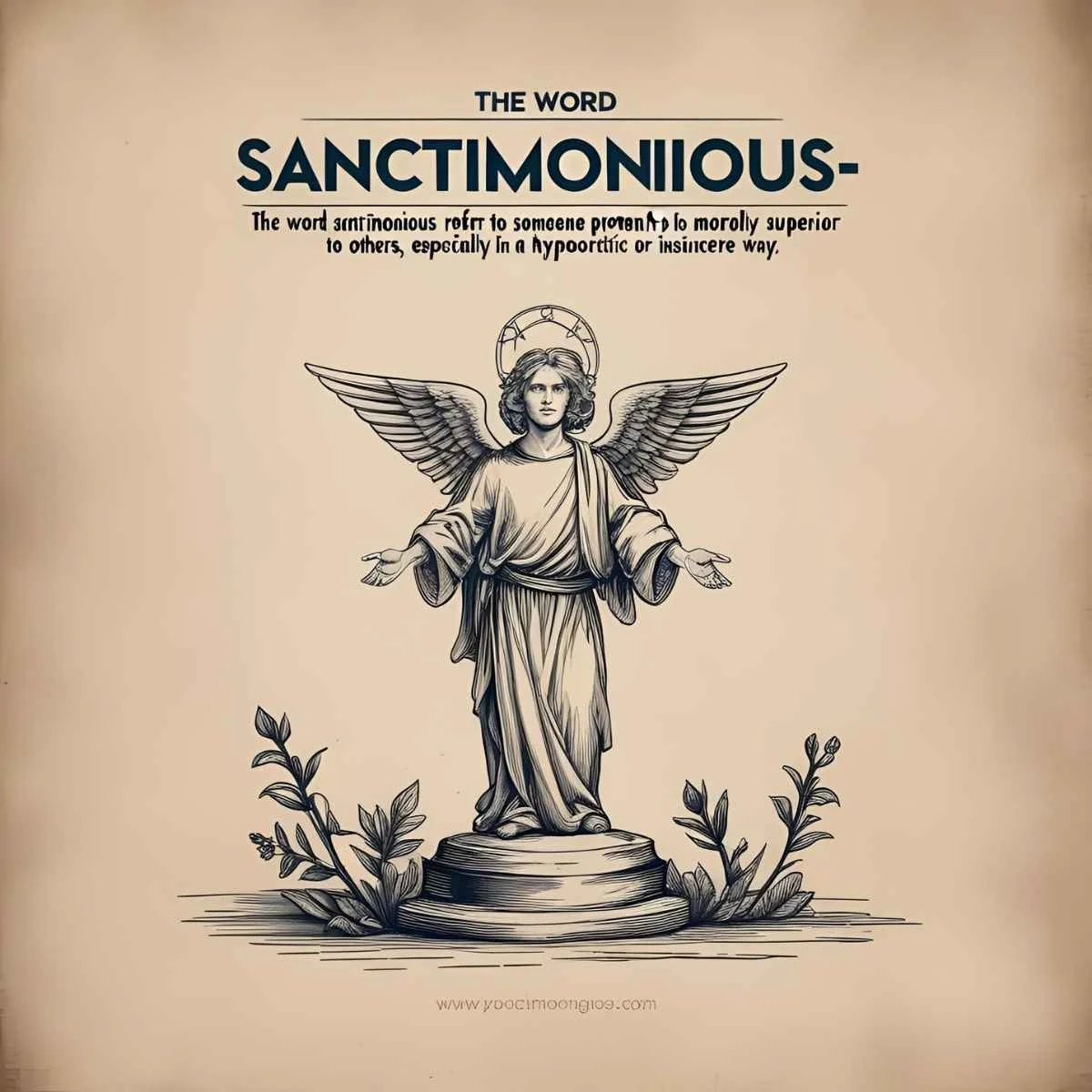Language is more than just a tool for communication—it’s a reflection of thought, tone, intention, and character. One such word that carries a complex emotional and moral undertone is “sanctimonious.” Often used in formal and academic discussions, this word can cut deep, as it accuses someone of moral superiority wrapped in insincerity.
In today’s world of nuanced communication—whether in professional emails, online debates, or thoughtful essays—knowing how and when to use “sanctimonious” (and when not to) can dramatically shape your message. This article explores:
- What “sanctimonious” really means in 2025
- Contexts in which it’s used
- Professional and casual alternatives
- Examples across real-world settings
- Emotional tone and connotations
- Polite substitutions to avoid offense
Let’s dig into this term that is often misunderstood, misused, or misinterpreted—yet powerful in the right context.
What Does “Sanctimonious” Mean?

The word sanctimonious refers to someone pretending to be morally superior to others, especially in a hypocritical or insincere way. It doesn’t simply describe someone who is moral or pious—it criticizes the appearance of virtue used for self-glorification or judgment of others.
🔍 Key Definition (2025 Update):
Sanctimonious (adjective): Displaying exaggerated or affected righteousness, often to make oneself seem morally superior while lacking genuine integrity.
📌 Key Characteristics:
- Self-righteous attitude
- Often hypocritical
- Implies condescension
- Tone: disapproving, critical, sarcastic
Origins and Etymology
The term originated in the early 17th century, from Latin sanctimonia, meaning “holiness.” Originally, it wasn’t always negative. Over time, however, English speakers began using it ironically, and today, it almost exclusively has a negative connotation.
When Should You Use “Sanctimonious”?
You should use this word when:
- Someone is preaching morality without sincerity
- There’s a hypocritical undertone to someone’s “goodness”
- You want to point out fake virtue signaling
- The context calls for a sharp, intellectual critique
🛑 Avoid using “sanctimonious” in personal conflicts or casual conversations unless you’re absolutely certain of the tone—it can come across as insulting or dismissive.
Modern Examples of “Sanctimonious” in 2025 Context
Here are some advanced and relevant examples where “sanctimonious” fits naturally in today’s conversations:
- “Her sanctimonious rant about climate change fell flat when people discovered her private jet usage.”
- “I’m tired of his sanctimonious tone every time he talks about ethical investing, especially since he’s been fined for tax evasion.”
- “The influencer’s sanctimonious apology video was clearly a PR stunt.”
- “There’s a sanctimonious air in how she criticizes others’ parenting, despite her own controversial choices.”
- “His sanctimonious speeches make it difficult to trust his intentions.”
Best Alternatives to ‘Sanctimonious’
Sometimes, “sanctimonious” is too harsh or too formal for a situation. Here are refined, updated alternatives for 2025 communication, categorized by tone:
✅ 1. Self-righteous
- Use when: Someone believes they are morally right, often ignoring other perspectives.
- Example: “He gets very self-righteous during political debates.”
✅ 2. Holier-than-thou
- Use when: You want a casual or slightly sarcastic tone.
- Example: “She gave me a holier-than-thou look when I ordered fast food.”
✅ 3. Preachy
- Use when: Someone gives unsolicited moral advice.
- Example: “He can be a bit preachy about healthy living.”
✅ 4. Moralizing
- Use when: Someone turns every topic into a moral lecture.
- Example: “His moralizing during team meetings is exhausting.”
✅ 5. Hypocritical
- Use when: Someone contradicts their own proclaimed values.
- Example: “It’s hypocritical to preach honesty and then lie on reports.”
✅ 6. Virtue-signaling
- Use when: Someone is displaying morality publicly for approval.
- Example: “That post feels more like virtue-signaling than genuine support.”
✅ 7. Judgmental
- Use when: The tone is overly critical of others.
- Example: “You don’t have to be so judgmental about their choices.”
✅ 8. Condescending
- Use when: The speaker acts superior in a patronizing way.
- Example: “His condescending tone undermined the message.”
✅ 9. Moralistic
- Use when: You want a neutral or academic tone.
- Example: “The novel had a moralistic theme that some readers found outdated.”
✅ 10. Overly pious
- Use when: Religion or faith is used in a performative or exaggerated way.
- Example: “His overly pious behavior feels more theatrical than spiritual.”
Tone Matters: Choosing the Right Word
Knowing which word to use isn’t just about synonyms—it’s about tone. Here’s how to choose:
| Situation | Recommended Alternative | Tone |
|---|---|---|
| Academic writing | Moralistic, hypocritical | Neutral/Formal |
| Casual conversation | Preachy, judgmental | Informal |
| Social media discussions | Virtue-signaling, self-righteous | Critical |
| Religious debates | Overly pious, sanctimonious | Formal/Sensitive |
| Corporate settings | Condescending, hypocritical | Diplomatic/Cautious |
Avoid words like “holier-than-thou” in emails to management or clients—it sounds too harsh and sarcastic. Use terms like “moralistic” or “self-righteous” instead, which are more tactful.
Real-World Usage in 2025
Language evolves. In 2025, “sanctimonious” has seen increased use in online culture, especially in critique of influencers, corporate branding, or political correctness. Many now associate the word with performative activism, faux empathy, or moral branding.
Example:
“While the company’s environmental campaign sounded noble, many viewers saw it as sanctimonious greenwashing—more show than substance.”
Polite or Professional Alternatives (With Better Reception)
Sometimes, you want to make a point without escalating conflict. In those cases, these polished alternatives can soften the impact:
- “That perspective feels a bit rigid in tone.”
- “I appreciate your values, though the message may come across as morally assertive.”
- “Let’s try to balance the discussion without getting too principled in tone.”
Using such phrases preserves your credibility, avoids direct insults, and ensures a professional tone even in disagreement.
Top 10 Advanced Examples to Use in Writing or Speech (2025 Edition)
- “Despite his public donations, his actions behind closed doors tell a sanctimonious tale.”
- “The senator’s speech had a sanctimonious edge that alienated even supporters.”
- “People are growing tired of sanctimonious marketing from brands that don’t practice what they preach.”
- “Her remarks sounded more preachy than helpful.”
- “The board’s decision felt moralistic, ignoring real-world complexities.”
- “There’s a virtue-signaling element to his sudden interest in activism.”
- “She framed the debate in a self-righteous tone that left no room for dialogue.”
- “Critics called the documentary judgmental rather than educational.”
- “The essay avoided sounding sanctimonious, striking a fair tone throughout.”
- “In 2025, public trust is built not by sanctimonious speeches but by transparent action.”
Quick Recap: Don’t Sound Sanctimonious—Sound Smart
Understanding this word is essential for strong, nuanced communication—especially in the modern world where tone shapes perception. Whether you’re speaking, writing, or posting online, choosing the right language determines how your message is received.
Use “sanctimonious” carefully, and explore alternatives when needed. If you want to disagree respectfully, opt for neutral or constructive phrasing. Save the sharper words for clear-cut hypocrisy.





